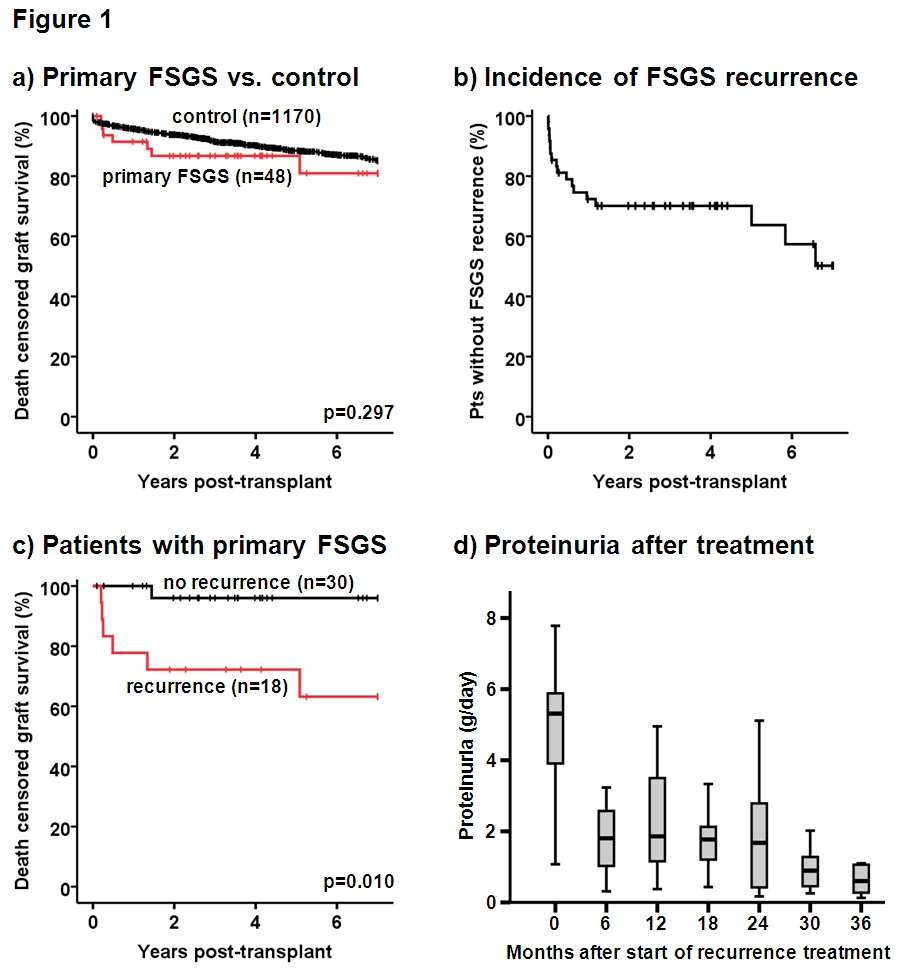Long-Term Outcomes of Kidney Transplant Recipients with Primary Idiopathic Focal Segmental Glomerulosclerosis (FSGS).
Nephrology, Charité
Universitaetsmedizin, Berlin, Germany
Meeting: 2017 American Transplant Congress
Abstract number: B165
Keywords: Graft survival, Recurrence
Session Information
Session Name: Poster Session B: Kidney Complications II
Session Type: Poster Session
Date: Sunday, April 30, 2017
Session Time: 6:00pm-7:00pm
 Presentation Time: 6:00pm-7:00pm
Presentation Time: 6:00pm-7:00pm
Location: Hall D1
Introduction:
Few data exists analyzing recurrence rates, treatment response and long-term outcomes in kidney transplant recipients (KTR) with primary FSGS.
Methods:
This retrospective observational study included 1218 consecutive KTR 2002-2016. All patients with primary idiopathic FSGS were identified applying strict diagnostic criteria. Outcomes were followed over an average of 70.4 months.
Results:
We identified 48 KTR (3.9%) with primary FSGS. 7-year death-censored graft survival was 81% (primary FSGS) vs. 85% (control), p=0.297 (Fig.1a). Among KTR with primary FSGS, 18 KTR experienced FSGS-recurrence (predicted incidence 50% after 7-years; Fig.1b). 7-year graft survival in KTR with FSGS-recurrence was significantly worse than in FSGS-KTR without recurrence (63% vs. 96%, p=0.010; Fig.1c). In case of FSGS recurrence a multimodal treatment approach was applied, including: plasma exchange (PE) (100% of patients), cyclosporine i.v. (50%), rituximab (61%) and the “multiple target treatment” according to Canaud et al. (AJT 2009) (39%). The median number of PE-sessions was 27. Proteinuria decreased significantly and persistently during the course of treatment (Fig.1d). Complete remission of FSGS was observed in 7 patients (39%), another 7 patients (39%) developed partial remission (PE-dependence observed in 4 patients (22%)). 4 patients (22%) with FSGS recurrence experienced early graft loss (< 6 months post-transplant) despite all treatment efforts.
In case of FSGS recurrence a multimodal treatment approach was applied, including: plasma exchange (PE) (100% of patients), cyclosporine i.v. (50%), rituximab (61%) and the “multiple target treatment” according to Canaud et al. (AJT 2009) (39%). The median number of PE-sessions was 27. Proteinuria decreased significantly and persistently during the course of treatment (Fig.1d). Complete remission of FSGS was observed in 7 patients (39%), another 7 patients (39%) developed partial remission (PE-dependence observed in 4 patients (22%)). 4 patients (22%) with FSGS recurrence experienced early graft loss (< 6 months post-transplant) despite all treatment efforts.
Conclusions:
In KTR with primary FSGS a high proportion of recurrences occurred during the long-term follow-up and led to significantly worse graft survival. However, a multimodal treatment approach mostly resulted in resolving of proteinuria and full or partial remission. Graft survival in KTR with underlying primary FSGS was comparable with the control group.
CITATION INFORMATION: Khadzhynov D, Halleck F, Lehner L, Schrezenmeier E, Budde K, Staeck O. Long-Term Outcomes of Kidney Transplant Recipients with Primary Idiopathic Focal Segmental Glomerulosclerosis (FSGS). Am J Transplant. 2017;17 (suppl 3).
To cite this abstract in AMA style:
Khadzhynov D, Halleck F, Lehner L, Schrezenmeier E, Budde K, Staeck O. Long-Term Outcomes of Kidney Transplant Recipients with Primary Idiopathic Focal Segmental Glomerulosclerosis (FSGS). [abstract]. Am J Transplant. 2017; 17 (suppl 3). https://atcmeetingabstracts.com/abstract/long-term-outcomes-of-kidney-transplant-recipients-with-primary-idiopathic-focal-segmental-glomerulosclerosis-fsgs/. Accessed June 30, 2025.« Back to 2017 American Transplant Congress
